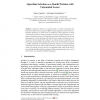Free Online Productivity Tools
i2Speak
i2Symbol
i2OCR
iTex2Img
iWeb2Print
iWeb2Shot
i2Type
iPdf2Split
iPdf2Merge
i2Bopomofo
i2Arabic
i2Style
i2Image
i2PDF
iLatex2Rtf
Sci2ools
134
click to vote
LION
2010
Springer
2010
Springer
Algorithm Selection as a Bandit Problem with Unbounded Losses
Abstract. Algorithm selection is typically based on models of algorithm performance learned during a separate offline training sequence, which can be prohibitively expensive. In recent work, we adopted an online approach, in which a performance model is iteratively updated and used to guide selection on a sequence of problem instances. The resulting exploration-exploitation trade-off was represented as a bandit problem with expert advice, using an existing solver for this game, but this required the setting of an arbitrary bound on algorithm runtimes, thus invalidating the optimal regret of the solver. In this paper, we propose a simpler framework for representing algorithm selection as a bandit problem, with partial information, and an unknown bound on losses. We adapt an existing solver to this game, proving a bound on its expected regret, which holds also for the resulting algorithm selection technique. We present experiments with a set of SAT solvers on a mixed SAT-UNSAT benchmark...
Related Content
| Added | 13 Aug 2010 |
| Updated | 13 Aug 2010 |
| Type | Conference |
| Year | 2010 |
| Where | LION |
| Authors | Matteo Gagliolo, Jürgen Schmidhuber |
Comments (0)

